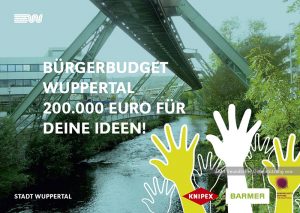Through the citizens’ budget, the city of Wuppertal, together with external sponsors, makes a budget available for public welfare-focused projects pitched by citizens (the budget is 200 000 € for 2021). All citizens of Wuppertal may submit their ideas and decide on the winning projects in several dialogue-based voting phases. Winning projects are included in the budget and developed by the city in close consultation with the idea creators.

© Stadt Wuppertal
Proposals are submitted in various areas: climate action, education, leisure and sports facilities, culture, health, etc. The exchange of ideas between Wuppertal residents about what is desirable for their city, as well as experiencing the impact they can make through participation, are the most important aspect of the process. The more they can promote their idea, e.g., in the neighborhood, the higher the chance that it will eventually be implemented. To show the people of Wuppertal that their commitment is worthwhile, a video will be made about the implementation of the winning projects, featuring the people who successfully pitched the ideas.
In many cases, projects developed through the citizens’ budget do not necessarily contribute to the reduction of the city’s ecological footprint. However, the programme does contribute to the activation and networking of Wuppertal residents and strengthens their sense of responsibility for their own environment. This is an important starting point for involvement in projects that #MoveTheDate as well.
Facts and Data
- In 2019: approx. 7000 people participated, 5 ideas were implemented out a total of 198 ideas submitted.
- In 2021: 203 ideas submitted, after 2 months already 36,000 views of the project platform and about 4,000 newly registered users.
- Launched in 2017, the project is currently being implemented for the third time.




